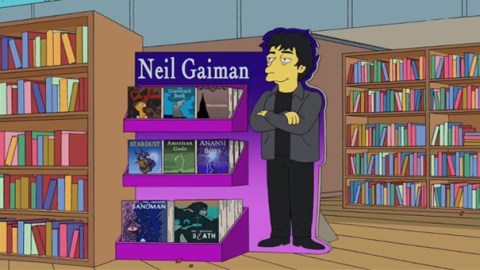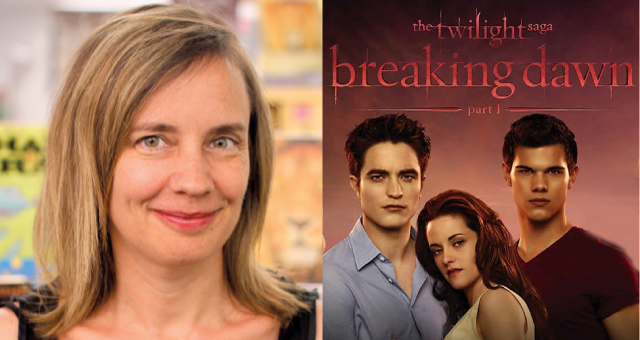The Book Job: Did the Simpsons Get it Right?

In case you missed it last Sunday night, the best Simpsons episode of this season so far (and arguably, the past few years) was posted on Hulu today. Publishing for young readers is squarely in the cross-hairs, and award-winning children’s author Neil Gaiman (Coraline, The Graveyard Book) makes the episode a snort-and-pause-the-DVR-to-watch-that-again masterpiece.
It all starts when Lisa discovers the author of her favorite Young Adult books playing a plush-headed dinosaur at a local museum and learns that the woman is just an actress whose picture was put on a book cover. The real author is a room full of corporate employees pounding out pages by committee. When Homer and Bart catch wind of the money to be made, they form a committee to get their own book deal, and bring Gaiman on to fetch snacks and beverages.
As a writer for teens, I’ve done work-for-hire books under pseudonyms, so the jokes in this episode hit incredibly close to home. As the conscience of the Simpson family, Lisa is dismayed to learn that everything she thought she knew about Young Adult literature is a lie, and questions the motives of releasing books created in boardrooms for profit.
Still, a part of Lisa loves these books, and the famous creation stories that they often come along with. As she says to the actress she thinks is the author of her beloved series:
“Of course you’re real. Everybody knows you got the idea for this series after an explosion at a crumpet factory knocked you off a double-decker bus. How could that be made up?”
It’s too bad that the writers didn’t make a firmer distinction between folks like Gaiman whose books are truly remarkable literature for young readers, and the pseudonymous work-for-hire books that Barnes and Noble buyers engender by asking publishers for specific books on specific subjects. The episode clearly references Harry Potter which is both factually incorrect and unfortunate. J.K. Rowling wrote every word of that series.
Whatever you think of packaging books for young readers, the bottom line is that kids are actually reading them, and that’s the important part. There is certainly value in any book that will make a young person shift his or her gaze from the iPhone screen long enough to read it.
Still, there’s more than a grain of truth in all of this. Naturally, that’s what makes it so funny.





